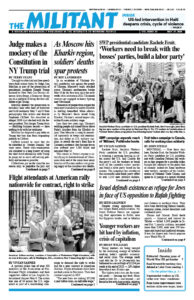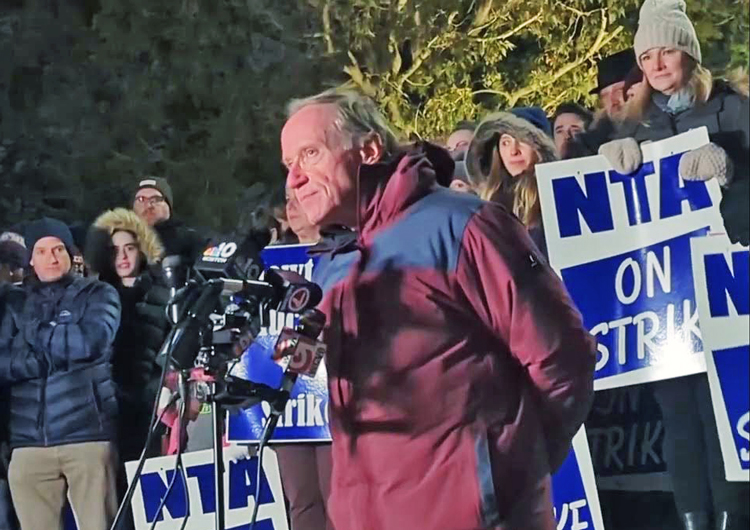CHICAGO — The increased mood of resistance in the working class was reflected in the Labor Notes 2024 conference, which took place here April 19-21. Among the 4,700 people attending were workers who had participated in recent strikes and contract fights — autoworkers, flight attendants, teachers, UPS workers and others. But many were union staffers, “community organizers,” academics and students.
The perspectives advanced by the conference organizers centered on building opposition “reform” caucuses, such as Teamsters for a Democratic Union, as the key way to revitalize the labor movement. This was often combined with supporting bourgeois “friends of labor,” mostly in the Democratic Party, or seeing union struggles as a way to pressure the capitalist government. Many argued the labor movement “strengthens America,” tying higher wages and other gains to bosses making higher profits and making progress against foreign competitors.
Several supporters of the Socialist Workers Party campaign of Rachele Fruit for president took part, finding interest among some participants in a different course. The SWP campaigners discussed the need for the working class to chart a class-struggle road forward, to break politically from all capitalist parties and candidates, to build a labor party based on the unions to organize workers in their millions to take political power.
The gains made in the United Auto Workers strike against the Big Three auto bosses last year were a theme of many conference sessions. Participants celebrated the announcement during the conference that workers at Volkswagen in Chattanooga, Tennessee, had just voted to join the UAW — the first organizing victory at an assembly plant of a non-U.S. automaker in the South.
One of the featured speakers at the final conference session was UAW International President Shawn Fain. He wore a union sweatshirt with a picture of a B-24 World War II “liberator” bomber. In the 1940s “we created the arsenal of democracy,” the UAW president bragged, in patriotic praise of Washington’s role in the Second World War, out of which the U.S. rulers took their dominant position in the imperialist world order. He referred to President Joseph Biden’s visit during the auto strike last fall to the Willow Run plant, where the bombers had been built. The UAW was an early endorser of Biden’s reelection campaign.
Debate over labor party
The question of whether workers should support the Democrats as a “lesser evil” was debated at a number of the 300 workshops. At one, titled, “Can unions seize the moment?” a presenter argued that Republican Donald Trump is so bad union members need to vote for Biden, even if they don’t like him.
“The Democrats and Republicans both represent the interests of the bosses,” responded Gabrielle Prosser, a member of the Bakery, Confectionery, Tobacco Workers and Grain Millers union and SWP candidate for Congress from Minnesota. “We need to build a labor party, based on the unions, that could organize the whole working class to fight for our own class interests. What we win on the picket line will always come under attack again as long as the bosses and their political parties remain in power.” She got some applause.
But Sara Nelson, international president of the Association of Flight Attendants, one of the panelists at that session, disagreed, saying building a labor party would be “divisive,” since union members have different political viewpoints. “We have the union, that is our party!” she declared. “We need to fight capitalism! Let the politicians come to us!”
That may sound radical, but those “politicians” she seeks to attract are from the bosses’ parties, leaving workers demobilized and dependent on the political plane.
Other schemes for organizing “worker centers” and “independent” unions as a “progressive” alternative to the existing labor movement were presented — from Amazon warehouses to organizing agricultural workers.
This came up at a workshop on farmworkers. Clay Dennison, a rail worker and member of the SWP from Seattle, spoke about the five-year successful organizing and contract fight carried out by Familias United in Washington state. He helped organize solidarity for them.
“They were embraced by members of established unions, including by the State Labor Council from early on in their fight,” Dennison said. “With the rise in labor struggles today there are better chances now for farmworkers and others to win solidarity from within the labor movement.”
Workers need our own foreign policy
The conference included several workshops promoting the Hamas-led call for a cease-fire in Gaza and calls for boycott of Israel. On the opening day, hundreds of conference participants chanting “Free Palestine” blocked the street near the conference venue and clashed with cops.
Socialist Workers Party campaigners had numerous discussions with participants about why it’s a crucial question for the working class to oppose Jew-hatred and pogroms, including the murderous Hamas assault on Jews in Israel. Some of these discussions were heated, but remained civil. Some people changed the subject, while others welcomed a discussion on these questions. “I thought I was the only one” who thinks Israel has a right to exist and defend itself, a grocery store worker from Los Angeles told this correspondent.
The scourge of Jew-hatred will be a life-and-death question for the working class as the crisis of capitalism deepens and the bosses look to fascist forces to crush the unions, as they did in Germany.
A labor studies student who is originally from Israel told Dennison she has been very disturbed by the atmosphere on campus and more broadly since Oct. 7. She signed up for a subscription to the Militant and got a copy of The Fight Against Jew-Hatred and Pogroms in the Imperialist Epoch: Stakes for the International Working Class. Overall, conference participants bought six copies of that book, along with 17 Militant subscriptions.
Another best seller was The Low Point of Labor Resistance Is Behind Us: The Socialist Workers Party Looks Forward, which addresses the situation working people face today. Teamster Rebellion by Farrell Dobbs and books on the Cuban Revolution also sold well.
Naomi Craine is a freight rail worker and member of SMART-TD in Chicago.


